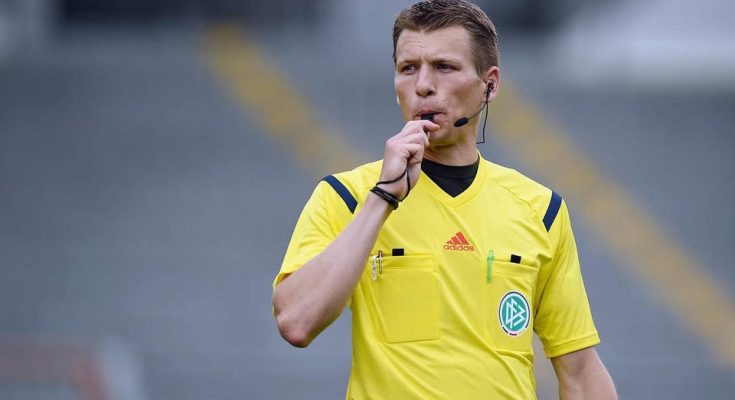Shock and disappointment gripped VfB Stuttgart as what should have been remembered as a bitter but routine Bundesliga defeat to SC Freiburg has now spiraled into a much darker chapter. The match itself, a fiercely contested duel between two historic clubs, was overshadowed by revelations that allegations of bribery may have influenced decisions surrounding the game. What started out as a clash defined by intensity on the pitch has now become the center of scandal, fueling heated debates across Germany about fairness, integrity, and the very soul of football.
The Stuttgart–Freiburg rivalry has always carried emotional weight. Meetings between the two sides are often charged with regional pride, as both clubs embody Baden-Württemberg’s fierce football tradition. Fans expected another installment of passion, drama, and perhaps heartbreak. Stuttgart entered the match eager to maintain their push for European qualification, while Freiburg were determined to climb back into form after a string of inconsistent performances. On paper, it was simply a Bundesliga contest with three valuable points at stake. But by the final whistle, whispers of corruption began circulating that would completely change the narrative.
The game itself unfolded in a manner that left Stuttgart supporters frustrated. Their team dominated possession in phases, carving out clear chances, but critical refereeing calls went against them at pivotal moments. A controversial penalty awarded to Freiburg raised eyebrows immediately. Stuttgart players surrounded the referee in disbelief, while the home supporters voiced their outrage. To add salt to the wound, a clear handball in Freiburg’s penalty box was ignored after a brief VAR review. These incidents, though not unheard of in football, took on a different dimension when reports began emerging that possible bribery might have been at play.
In the immediate aftermath, media outlets reported that investigators had been alerted to “unusual betting patterns” surrounding the match. This triggered speculation that external influence may have crept into the referee’s decision-making or other facets of the contest. The Bundesliga, priding itself on its reputation for transparency and fair play, now finds itself facing an integrity crisis. Fans of Stuttgart, who were already dealing with the disappointment of defeat, now feel robbed of the certainty that their team lost fairly on sporting merit.
At the heart of the storm are suspicions that individuals linked to betting syndicates may have tried to sway the outcome of the game. Authorities have not confirmed names or direct evidence, but the mere suggestion has been enough to ignite anger among supporters and panic within the corridors of German football administration. Bribery in football is not a new phenomenon, yet every time it rears its head, the sport is left shaken. For Stuttgart, who have been enjoying a resurgence under Sebastian Hoeneß, the timing could not have been worse.
The club itself has responded cautiously, releasing a statement that emphasized their full cooperation with any investigation while calling for patience and due process. Stuttgart’s management stressed that they trust the Bundesliga’s governing bodies to uphold the principles of fairness and punish wrongdoing if proven. Yet behind the calm exterior lies real fury. Hoeneß, known for his passionate defense of his players, reportedly expressed anger in private about what he felt were inexplicable decisions during the match. His post-match press conference, though restrained, contained pointed remarks about the need for “clarity and accountability.”
For Freiburg, the win should have been a moment to celebrate. Instead, their triumph has been tainted by suspicion. Christian Streich, their long-serving coach, expressed frustration that his team’s efforts were being overshadowed by scandal. “We fought hard, we played football, and my players deserved respect for their work,” he said when asked about the allegations. Yet even Freiburg fans cannot escape the cloud of uncertainty. No club wants their victories questioned, particularly in such a heated regional rivalry.
The fallout has extended beyond the clubs directly involved. Across Germany, football fans are asking painful questions about the reliability of results. The Bundesliga has long prided itself on being a model of integrity, often contrasting itself with scandals that have plagued other leagues. Now, that self-image is under threat. The German Football Association (DFB) and the Deutsche Fußball Liga (DFL) have promised a full investigation, while politicians have weighed in, calling for tougher safeguards against corruption in sport.
The psychological impact on Stuttgart’s players cannot be overlooked. Competing week in and week out requires focus, resilience, and belief in the fairness of the game. When players begin to suspect that outside influences are undermining their work, motivation and trust can quickly erode. Veterans within the squad have spoken privately about their anger, while younger players have struggled to process the idea that their performance may not have been the only factor determining the outcome.
For supporters, the scandal cuts even deeper. Football is built on the bond between club and community, a bond rooted in shared emotion, sacrifice, and belief in the drama of the sport. To discover that such emotions may have been manipulated by bribery feels like a betrayal. Stuttgart’s loyal fans, who fill the Mercedes-Benz Arena with passion every week, now find themselves questioning not only refereeing decisions but also the authenticity of the competition itself. Anger has spilled onto social media, with demands for transparency and justice trending across platforms.
There is also a financial dimension to consider. Stuttgart’s ambitions of European qualification carry enormous economic significance. A single unfairly lost match could make the difference between Europa League revenue and missing out entirely. In modern football, where financial stability often depends on international competition, the stakes could hardly be higher. If bribery is confirmed, Stuttgart may argue that they were robbed not just of pride but of tangible resources that impact their long-term growth.
The scandal also threatens to damage the reputation of the Bundesliga abroad. International broadcasters and sponsors pay significant sums for a product they believe represents high-quality, honest competition. If doubts begin to spread, the value of the league’s image could decline. Already, foreign media have picked up on the story, framing it as a test of Germany’s ability to safeguard its football from corruption. The longer the investigation drags on without resolution, the more damage could be inflicted.
In a wider historical context, this episode echoes past corruption cases in global football. Italy’s infamous “Calciopoli” scandal, which rocked Serie A in 2006, still lingers as a cautionary tale. Germany has largely avoided such explosive crises, which is why the current suspicions feel especially shocking. The Bundesliga has often been held up as a model of fan ownership, financial stability, and ethical governance. If these allegations are proven, it would mark a severe blow to that proud identity.
As of now, nothing has been conclusively proven. Stuttgart’s defeat stands in the record books, and Freiburg hold the points. Yet the story is no longer about three points in the Bundesliga standings—it is about the credibility of the competition. Every new detail is dissected by pundits and journalists, while legal experts weigh in on the potential consequences. Some argue that if bribery is confirmed, a replay of the match should be ordered. Others believe only the individuals directly responsible should be punished. What unites all perspectives is recognition that German football faces a crucial test of integrity.
In the coming weeks, investigators will seek to trace financial flows, examine betting records, and scrutinize communications involving key figures around the match. The pressure will be immense, with fans demanding swift answers. Yet such investigations are rarely quick, and patience will be required. For Stuttgart, the challenge is to keep their season on track while living under the shadow of suspicion. For Freiburg, the task is to prove that their success was legitimate and not the product of unfair advantage. For the Bundesliga, the mission is nothing less than restoring confidence in the game.
Shock and disappointment are powerful emotions, but they can also serve as catalysts for change. If this scandal leads to stronger protections against corruption, stricter monitoring of betting activity, and greater accountability for refereeing decisions, then German football may yet emerge stronger. But the road to that outcome will be painful, and for Stuttgart fans in particular, the bitter taste of this defeat will linger long after the final whistle.
The match between Stuttgart and Freiburg was supposed to be another chapter in a proud rivalry, a showcase of football passion in Baden-Württemberg. Instead, it has become a cautionary tale about the fragility of trust in sport. Until the truth is uncovered, suspicion will hang heavy over both clubs, the Bundesliga, and German football as a whole. For now, one thing is clear: what should have been a story about goals, tackles, and tactics has turned into a scandal that forces everyone to confront uncomfortable questions about fairness, honesty, and the price of betrayal in the beautiful game.



